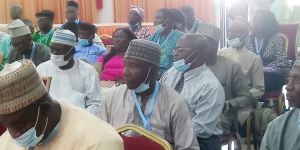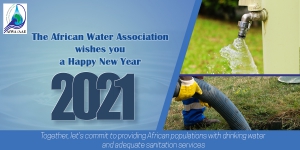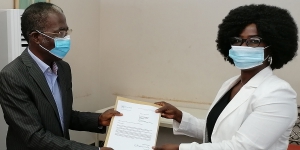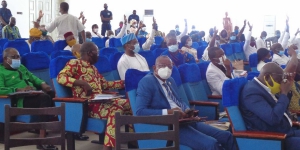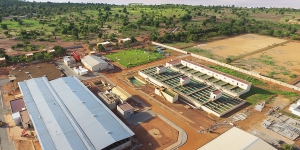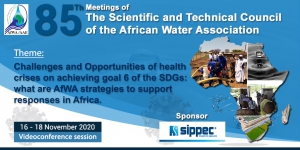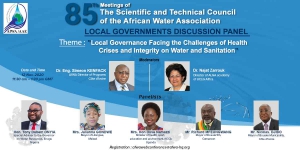Nzickonan Stéphanie
COVID 19 at the heart of the discussions of the 27th regular meeting of the National Water Resources Council of Nigeria
The 27th Regular Meeting of the National Council on Water Resources themed “Managing Water Resources in Crisis: The Nigerian Experience” which started on Monday 30th November, 2020 came to a successful close on Friday 4th December, 2020. Many people attend despite the COVID 19 Pandemic. The Council was an assemblage of policy makers, technical experts, development partners and the African Water Association (AfWA) – Nigerian Water Supply Association (NWSA) Focal Person for Nigeria.
The objective of the meeting was to provide solutions to the challenges facing the water, sanitation and hygiene (WASH) sector, address the climate change factor and solicit higher engagement of sector stakeholders. The council meeting focused on addressing the water challenges faced by the Nigerian Water Sector from pre and post COVID 19 Pandemic and the impact of Climate Change on Integrated Water Resources Management.
The council opened with the plenary technical session where critical issues from the previous council meeting were raised on the review of adopted action memos. It was noted that though COVID-19 has come with a lot of challenges, it has nevertheless engendered professionalism and a collaborative spirit in sector-wide response in combating common problems and driving coordination between companies, where possible.
The meeting emphasized the importance of safely managed WASH services for prevention and protection of human health during infectious disease outbreaks including the current COVID-19 pandemic. Emphasis was laid on investing in core public health infrastructure, including water and sanitation systems. This was also considered critical during the recovery phase of a disease outbreak to mitigate secondary impacts on community livelihoods and wellbeing.
The AfWA-NWSA Focal person highlighted the challenges that face the sanitation sector drawing from his valued experience garnered from working with AfWA in Nigeria. While making contribution to the need for harmonization and control of urban sanitation activities, he observed that one of the reasons why sanitation, particularly faecal sludge management, has been so much neglected is that it often lacks institutional, household and good governance. He noted that AfWA preliminary effort at identifying critical sanitation operators in states reveals that roles are not properly streamlined as various states have various arrangements, while some have no defined arrangement.
The forum offered the AfWA-NWSA Focal Person the occasion to inform the Council during the Technical plenary, and the Committee of Managing Directors of Water Agencies in a specially scheduled meeting with NWSA, that AfWA has earmarked six municipalities in six states viz; Enugu, Lagos, Delta, FCT, Ogun and Niger states in Nigeria to benefit from the Citywide Inclusive Sanitation (CWIS) and two states Utilities; FCT Water Board and Taraba State Water and Sanitation Corporation to benefit from the Water Quality Improvement Programme. Water Agencies and operators therefore used that opportunity to make enquiries on strategies to enhance performance and strengthen relationship with AfWA.
Despite the effort of AfWA to strengthen collaboration with member Utilities of the Nigerian Water Supply Association to improve their performance it was noted that a very small number of utilities registered. It therefore urged the Council to give support to Utilities in Nigeria to enable them register with AfWA to benefit from its robust capacity building and peer-to-peer programme and to encourage states’ cooperation on same. That was part of the strategic effort at enhancing utility registration and overcoming the bureaucratic bottlenecks in securing yearly approvals.
Rev. (Engr.) Francis UMEMEZIA
(AfWA-NWSA Focal Person)
Happy New Year 2021
"Dear members,
Dear partners,
While COVID 19 has slowed the world's momentum in 2020, it has not altered our commitment to improve access to drinking water and sanitation on the continent.
In 2021, we will do more.
AfWA thanks you for your confidence and wishes you a warm holiday season".
Improving Water, Sanitation, and Hygiene needs: Eight Cote d’Ivoire Municipalities Selected to Participated in the USAID-funded MuniWASH Project
Improving Water, Sanitation, and Hygiene needs: Eight Cote d’Ivoire Municipalities Selected to Participated in the USAID-funded MuniWASH Project
It's official, eight municipalities in Côte d'Ivoire were notified of their selection for participation in the West Africa Municipal Water, Sanitation and Hygiene MuniWASH Activity. The MuniWASH activity is a five-year regional project funded by the United States Agency for International Development (USAID) and implemented by Tetra Tech, Inc in Benin and Côte d'Ivoire. USAID's objective through this project is to assist municipal governments, national departments and agencies, and service providers to maintain and expand water, sanitation and hygiene services to meet the basic needs of underserved populations and disadvantaged segments of the population living in urban and peri-urban areas of the municipalities.
This announcement is a result of a selection process involving several state and private agencies such as the General Directorate of Territorial Administration, the National Drinking Water Office, the National Office of Sanitation and Drainage, the Hydraulic Directorate, the Water Distribution Company of Côte d'Ivoire, and finally, the Union of Cities and Communes of Côte d'Ivoire. In Côte d'Ivoire, the eight municipalities are Abengourou, Abobo, Bouaké, Gagnoa, San Pedro and Soubré, Yamoussoukro and Yopougon, some of which are also intervention sites for the USAID-funded Sanitation Services Delivery (SSD) project for the period 2014-2021. MuniWASH will support and extend the achievements of the SSD project as emphasized by MuniWASH Project Director Safaa Fakorede: "MuniWASH will use the sanitation contractors trained by SSD in Benin and Côte d'Ivoire to enable them to scale up their activities, particularly through the mobilization of capital."
During the month of September 2020, the MuniWASH project team met with the municipal councils in each of the target communes. This official notification meeting of the final selection of municipalities was an opportunity to present the MuniWASH project to the various stakeholders. These included mayors, municipal councilors, secretaries general, heads of technical services, some regional directors of ministries in charge of water and sanitation as well as private sector operators operating at the local level.
The MuniWASH implementation team took advantage of this tour to also present the project to the regional authorities including the prefects. The secretary general of the Gagnoa Prefecture was pleased with the implementation of this project focused on capacity building. “The best investment is the one made for people, that is to say capacity building. More than 80% of selected municipal officials are not aware of the duties assigned to them. We must therefore train them," he explained. During the exchanges, it was noted that there is a very high expectation from the municipalities in terms of infrastructure funding. We thought that the project was going to finance the infrastructure directly," said Koulaï Marius, technical director of the municipality of Gagnoa in Côte d'Ivoire. Through this tour, the MuniWASH team explained the project’s role was not to provide direct infrastructure funding, but to holistically improve municipal governance and the investment environment so that the municipalities could secure and manage the funds themselves. For the secretary general of the Soubré municipality, Mr. Lacina N'DA Jean, it is necessary to "support capacity building by granting direct financing to the communes".
MuniWASH places the improvement of municipal management and governance in water, sanitation and hygiene services at the center of its actions. With the support of the Ministry of Territorial Administration through the Directorate of Decentralization and Local Development, the MuniWASH project will strengthen the capacities of the municipalities for better governance of the water and sanitation sector at the municipal level.
In addition, MuniWASH aims to improve the financial sustainability and private sector investment for WASH service providers and to improve the operational reliability of WASH service providers. The project will share successful experiences and lessons learned from the implementation of these activities along with disseminating good practices at national and regional levels, primarily through channels hosted by the African Water Association (AfWA), which will allow a wider audience of municipalities to benefit from the knowledge gained in MuniWASH’s implementation.
Eight Benin municipalities selected to participate in USAID-funded MuniWASH project
Improving Water, Sanitation and Hygiene needs: Eight Benin municipalities selected to participate in USAID-funded MuniWASH project
It's official, eight municipalities in Benin are finalists for the USAID-funded West Africa Municipal Water, Sanitation, and Hygiene MuniWASH Activity. This announcement is a result of a selection process involving the Ministry of Decentralization and Local Governance, the Ministry of Water and Mines, the Benin National Water Company, and the Beninese Association for Social Marketing and Communication for Health, among others. The selected municipalities are Abomey-Calavi, Allada, Aplahoué, Avrankou, Bohicon, Cotonou, Ouidah, and Sô-Ava. Some are target areas of the Sanitation Services Delivery (SSD), an activity also funded by USAID for the years 2014-2021, and will complement MuniWASH activities.
The MuniWASH activity, is a five-year regional project funded by USAID and implemented by Tetra Tech, Inc. in Benin and Côte d'Ivoire. USAID's objective through this project is to assist municipal governments, national departments and agencies, and service providers to maintain and expand water, sanitation, and hygiene services to meet the basic needs of underserved populations and disadvantaged segments of the population living in urban and peri-urban areas.
In September 2020, the MuniWASH team met with each municipality’s council, which provided an opportunity to present the project to the different actors involved. These included mayors, city councillors, technical officials of the municipal administration, decentralized state services as well as private sector operators operating at the municipal level. In the community of Aplahoué, for example, the Société Nationale des Eaux (SONEB) took part in the meeting.
During exchanges, it emerged that the communities were very willing to commit themselves to MuniWASH. "This project is welcomed, we are ready to sign with MuniWASH," said Ahouandjinou Randyx, First Deputy Mayor of Cotonou, the economic capital of Benin. Access to drinking water services remains a challenge in Benin, although there has been a significant improvement over the last decade. According to the 2018 Demographic Health Survey (EDS5), the use of drinking water from an improved source in Benin increased from 67 percent in 2001 to 71 percent in 2017-2018. This growing increase in the rate of access to water in urban areas is now 62% according to SONEB's 2019 report. However, according to the Mayor of Avrankou, Mr. Ganhoutode Sèna Gabriel, additional efforts still need to be made: "the problem of drinking water is acute. Our peri-urban areas suffer greatly from the lack of access to drinking water. Our desire is to see MuniWASH carry out concrete actions that have a direct impact on the populations by allowing them to have better access to water and sanitation," he said.
For their part, the municipal council members of each of the eight municipalities met in deliberation sessions and gave their approval to authorize the Mayor to sign the Memorandum of Understanding between MuniWASH and the Municipality for the implementation of the program.
MuniWASH is focused on the reinforcement of operational, financial, and technical capacities of municipalities for better governance of the water and sanitation sector at the municipal level. “The capacity building component will help city hall executives to improve their performance,” continued Mr. Gabriel.
In addition, the project aims to improve the financial sustainability and private sector investment in WASH access and service providers and the operational reliability of public services and WASH service providers. As Mr. Gabriel explains, many participants welcomed the fact that “MuniWASH will work to mobilize resources for infrastructure financing to improve the conditions of poor and underserved households.” Ultimately, the successful experiences and lessons learned from the implementation of these activities will be shared and good practices disseminated at national and regional levels, primarily through channels hosted by the African Water Association. This will allow municipalities that were not selected for the program to benefit from the knowledge gained in MuniWASH’s implementation.
Burkina Faso: When the Ziga Dam puts an end to the water chore in Ouagadougou
Access to water for the greatest number of people has been one of the components of the social project of Burkina Faso for decades. In spite of the many actions carried out, water supply difficulties persist in the country. They are the result of two aggravating contextual factors: natural water scarcity and urban growth, which puts increasing pressure on the available resource and on existing infrastructures. Ouagadougou has climatic and geographical conditions that lead to an almost endemic water shortage with a permanent risk of drought. The natural hydrographic network is very limited. It consists of a single talweg, the Boulmigou, which crosses the city from east to west, to which a series of very temporary streams are connected due to climatic conditions. The city belongs to the northern Sudanese climatic domain characterized by relatively high annual temperature amplitudes and very irregular rainfall. Rainfall is heavy in July-August in terms of volume and in May and September in terms of strength. A large part of the rainfall is returned to the atmosphere by evapotranspiration, thus reducing the amount of rain that actually infiltrates the subsoil. This infiltration is further compromised by the waterproofing of urbanized surfaces, which promotes runoff.
Providing water to the population
To meet the ever-increasing need for water, the Loumbila Dam, located 20 kilometers from the capital, was built in 1970. Subsequently, as the rainfall deficit in 1983 led to the very partial filling of the dams, a program to develop catchment assets exploiting underground resources was set up, particularly in the outlying districts of the city, through the construction of mechanical boreholes or manual pumps. However, drilling is only a short-term complementary solution due to the absence of continuous and large-capacity aquifers. In 2006, the State began the construction of the Ziga Dam on the Nankamba River, located about 50 kilometers from the city, to serve as a third source of supply. This dam should ensure the sustainability of the water supply to the capital.
100% of the capital’s population has access to water
With a capacity of 207.8 million m3 of water and a catchment area of approximately 20,800 km2, the Ziga Dam was impounded in 2000. It feeds an eponymous plant of 12,000m3 per hour and includes two raw water stations (SP1 and SP1 bis), a treatment plant and two drinking water discharge stations (SP2 and SP2 bis). The dam produces 12,000m3 per hour for the needs of approximately 2,400,000 and 1210 fountain terminals in the Burkinabé capital and surroundings. Thus, the Ziga Dam alone is sufficient to cover the needs of the population of the Burkinabé capital estimated at about 2,800,000 inhabitants. The intermittent water supply in the capital is now a distant memory for the inhabitants.
Threats to water quality
The people living along the dam practice market gardening on the banks and move into the dam bed as the water recedes. To control insects and pests (worms, rats, rat thieves, hares, partridges, wild guinea fowl, ...) that destroy their vegetables, they use synthetic pesticides, many of which are prohibited. Fertilizers are also used. This poses a serious threat to water quality and, by ricochet, to the lives of the population. Another element that threatens the quality of the water produced by the Ziga Dam comes from nature: algae, whose development is caused by animal excrement and chemical fertilizers. In addition to threatening the quality and sustainability of the water, these algae increase the cost of water production. In fact, these plants produce substances that give the water rotten and septic tank odors as well as moldy flavors that endanger the water’s drinking quality.
Natural and innovative solution
In view of the negative impact of algae on water quality, the environmental and social laboratory of Burkina Faso’s National Office for Water and Sanitation (ONEA) has been developing since 2010 alternative solutions to the misuse of chemicals. The innovative solution found by ONEA to overcome these toxic algae is the introduction of planktophagous fish, tilapias (for which these toxic algae are a main food), into the dam water. Thus 4.5 million tilapias of 50 grams have been introduced for the purification of the 208 million m3 of water of Ziga. In terms of benefits, this allows ONEA to lower the quantity of chemicals used to always serve quality water. After 3 years, the populations are allowed to catch these fish, (non-toxic for humans), which allows the injection of 315 million FCFA into the economy.
Protection measures
In addition, ONEA has taken strict measures to protect the dam water from other sources of pollution. An easement zone or protection perimeter has been defined around the dam to prevent certain acts of pollution by man and damage to the catchment facilities. To this end, it is strictly forbidden to fish (outside the periods set aside for tilapia fishing), to water the animals and to market gardening on the banks upstream from the dam. Ordinary fishing is only permitted downstream. Finally, in order to fightn against silting and evaporation of water from the Ziga Dam, the National Water and Sanitation Corporation (ONEA) is gradually reforesting the Ziga Dam’s easement zone.
Regular quality control
Like all water produced in Burkina Faso by ONEA, the Ziga Dam waters are subject to universal conformity control, in particular the standards (WHO Recommendations) in force, for physico-chemical, organoleptic and microbiological parameters. This control is carried out in several phases. Firstly, on-the-spot monitoring by the water production agents every two hours. Secondly, internal monitoring by ONEA’s Central Laboratory at least once a month, with the capacity to search for micropollutants (heavy metals and pesticides). Finally, the external control of the National Laboratory of Public Health.
From dam to faucet
The Ziga Dam was built with the financing of 12 donors and cost about 150 billion FCFA for Phase I, and 107 billion FCFA for Phase II. Its implementation will ensure universal access to drinking water for the population of Ouagadougou, but also improve the quality of service by ensuring continuity of service 24 hours a day, including in the hot season and in all districts of the capital city. With this «Ziga Dam» project, we can say that the objective of the President of Faso, His Excellency Roch Marc Christian KABORÉ, who has committed to eradicate the chore of fetching water by 2020, has been achieved for the city of Ouagadougou. Finally, it should be noted that in terms of access to water in Burkina Faso, with respect to Goal 6 of Sustainable Development, progress was recorded in 2017 with an access rate to drinking water of 66.2% in rural areas and 91.7% in urban areas.
Achievement of SDGs 6: AfWA experts present strategies to support responses in Africa in a context of health crisis
“ We all know that in the last few months, the world has undergone a very big change. And we all talk about the new normal. As AfWA Members, we have continued to keep in touch and continued to do our work as the STC during trying times, but I believe that we have made great strides.”
It is in these proud words that Dr. Rose Kaggwa, 2nd President of the Scientific and Technical Council of the African Water Association addressed the participants of the 85th STC meeting which was held from 16 to 18 November 2020 under the theme " Challenges and Opportunities of health crises on achieving goal 6 of the SDGs : What are AfWA strategies to support responses in Africa. "The second president expressed her satisfaction for the resilience shown by AfWA members during the health crisis since despite travel restrictions, the association's meetings continued in virtual mode.
Dr. Kaggwa explained that COVID 19 increased water needs and confirmed the importance of having this resource available to fight the disease. She welcomed the fact that in most countries, handwashing facilities were made available even to populations outside the supply networks. This is why she advocated that, in the context of achieving SDGs, "these facilities should be transformed into real domestic connections".
The President of the STC, Dr. Papa Samba for his part sounded the alarm: "COVID-19 risks wiping out decades of progress" and referring to the theme, he recalled that despite the health crisis that has slowed the momentum of humanity as a whole, "we have goals to achieve, because this crisis does not remove the challenges we have in terms of access to sanitation and water services for people in Africa. Africa, where 320 million people still do not have access to safe drinking water and 695 million people in sub-Saharan Africa do not have access to adequate sanitation". He invited his peers to resolutely join the move towards the achievement of the SDGs.
The opening ceremony of the STC began with a minute of silence in memory of Mr. Zadi Kessy Marcel, founding father of AfWA, died on October 13, 2020. The meeting continued with the conference of industrialists who proposed innovative technologies to accelerate access to water and sanitation services on the continent.
The second day was devoted to reflection on the reorganization of the STC, especially the establishment of specialized groups, and was presented by Dr. Papa Samba DIOP.
The last day focused on the "State of progress of the preparations for the 21st AfWA International Congress CONAKRY 2022 " and on two presentations on (1) the "Effects of non-revenue water on the technical and financial management of water utilities: case studies of Burkina Faso and Côte d'Ivoire; and (2) the "Needs required in terms of institutional capacity building for the implementation of an inclusive sanitation project at the city level in Côte d'Ivoire and Ghana".
Finally, there was also a lengthy discussion about a questionnaire for members, a satisfaction survey, which a firm recruited for the need will conduct in the coming days to all AfWA members.
The 86th meeting of AfWA' Scientific and Technical Council will take place in February 2021.
African local governments share their experience in providing water and sanitation services during the COVID-19 pandemic.
As a prelude to the 85th session of its Scientific and Technical Council, the African Water Association organized a panel discussion with mayors and local governors from 5 African cities on Thursday, November 12, 2020, under the theme: "Local Governance Facing the Challenges of Health Crises and Integrity for Water and Sanitation".
Co-moderated by Dr. Najat ZARROUK, Director of the ALGA Academy of UCLG Africa and Dr. Simeon KENFACK, AfWA ‘s Programs Director, this panel was considered as a forum for governments to share with their peers, the experiences learned in managing the COVID-19 pandemic, as well as the difficulties of managing the work of providing water and sanitation services, especially from the point of view of acts of corruption, and approaches to solutions to combat the scourge.
Invited to this panel were Tony Dubem ONYIA, Special Advisor to the Governor for Water Resources, Enugu State, Nigeria; Julianna GONDWE, Mayor of Lilongwe, Malawi; Richard MFEUNGWANG, Mayor of Douala 5è, Cameroon; Nicolas DJIBO, Mayor of Bouaké Commune, Côte d'Ivoire and Honourable Olive Namazzi, Minister of Health, Sports, Education and Environment, KCCA, Uganda.
In their communication on the management of COVID 19, the 5 panelists presented similar actions implemented, particularly in terms of barrier measures to reduce the chain of transmission of the virus. These include the wearing of masks, social distancing, closure of public house, etc. In terms of water quality service management in the current pandemic environment, panelists reported that they have installed water tanks and water points in communities that do not have access to tap water; the installation of hand-washing stations in public services and places (markets, hospitals and schools), the installation of free or low-cost emergency toilet services in various locations, the provision of free water services to the population without disconnection in cities; the rehabilitation of failing water and sanitation systems, especially in rural areas; and the support of state governments was necessary for the strengthening of water and sanitation infrastructure.
The panelists all learned lessons from this health crisis, the very first one they faced in the exercise of their mandate, with the exception of Honourable Olive Namazzi, who experienced the cholera crisis in Uganda. This is why, in order to prevent or manage this type of situation in the future, they advocate capacity building of local structures in charge of water; the establishment of committees to monitor and raise awareness on personal and collective hygiene rules for behavioral change; the regular organization of environmental sanitation campaigns and training in disaster management; the improvement of emergency response systems, coherent and effective communication and finally the prioritization of the health sector in the investments budget.
On the issue of corruption, the panelists stated that they have unfortunately been confronted with it, particularly in the management of water and sanitation projects. The measures taken to deal with it include the establishment of integrated fight cells, with the support of civil society and village representatives for reporting such acts; the inclusion of measures to respond to corruption (restitution and/or jail) in legal instruments relating to water management.
The last point of discussion of this panel was related to the World Water Forum Dakar 2021 and in particular the support expected from AfWA for a strong mobilization of elected officials. In this sense, the panelists pleaded for a total or partial assumption of responsibility by AfWA for local governments. They recognized that this forum could offer them high level exchange frameworks, with a view to forging partnerships, and strengthen their capacities to be effective in their task.
The panel ended with the full satisfaction of the governors and their desire to see more of these types of meetings to learn from each other.
the population should be sensitized to connect to a sustainable and decent sanitation facility and to equip themselves with adequate hand-washing facilities
Before any substantive development, I would like to thank Mr. Sylvain Usher, Executive Director, for giving me the opportunity to speak in my capacity as President of REDFEPEA on the occasion of World Toilet Day celebrated on November 19, whose theme this year is "sustainable sanitation and climate change".
Indeed, recently, climate change had a significant impact on the Republic of Djibouti, particularly with the frequent and intense floods that have caused major disasters.
The Ministry of Agriculture, Livestock, Water and Fisheries in charge of fishing resources in collaboration with ONEAD and REDFEPEA, the Djiboutian network of fisheries women, water and sanitation professionals will celebrate this World Toilets Day by organizing various activities. First of all, the population should be sensitized to connect to a sustainable and decent sanitation facility and to equip themselves with adequate hand-washing facilities. This awareness of the importance of handwashing for household safety will consequently annihilate illnesses related to lack of hygiene and will thus, in the long term, increase the life expectancy of these households.
In this regard, since youth is the best vector for raising awareness, we make schools a priority in our awareness activities, especially in this time of pandemic COVID19 crisis, it is important to recall the essential gestures.
Mariam AHMED, Djiboutian Network of Professional Women in Water and Sanitation
Together, let's make our toilets a means of preserving life.
The phenomenon of climate change is a reality in Côte d'Ivoire, as in the rest of the world. Even if the country does not seem to be seriously affected by the phenomenon yet compared to some others, the balance could tip at any time and harm the country's economy.
Indeed, the country's economic growth is partly based on the use of its stock of natural resources. According to Mr. Pierre Laporte, the World Bank's Director of Operations for Côte d'Ivoire, these resources have decreased by 26% between 1990 and 2014. Several visible phenomena confirm this degradation. Among them include deforestation and depletion of water reserves.
With regard mainly to water resources, which are heavily impacted in terms of both quantity and quality, safeguard actions include the fight against all forms of pollution and particularly, the adequate management of sanitation systems.
With more than 80% of the population having recourse to the autonomous sanitation system, it is up to each one individually or collectively, through our households, emptying companies or through the intervention of organizations and institutions to promote:
- the realization and maintenance of adapted sanitation works, in particular toilets and septic tanks ;
- a secure collection and transport system ;
-the provision and proper operation of dedicated treatment units.
With our farmers, let's go even further by using the product of our toilets as fertilizer to safely stimulate agriculture and reduce and capture greenhouse gas emissions.
Indeed, a recent study published by the Soil Association reveals that conversion to organic farming makes it possible to sequester in the soil, on average, between 400 and 500 kg of carbon, or approximately 1650 kg of CO2, per hectare and per year. Therefore, it would be sufficient to sequester 200 kg of carbon per hectare per year in all cultivated land to offset all greenhouse gas emissions.
Thus, carbon sequestration in the soil appears to be an important key in the fight against global warming.
Together, let's make our toilets a means of preserving life.
With our toilets, we preserve our natural resources and create wealth in a circular economy.
Sié Palé Julienne, president of the National Association Toilets for All, Côte d'Ivoire
Nothing is more astounding than to see that in Africa, the same people who do not have access to toilets are walking around communities with their heads held high with a smartphone in their hand...
Nothing is more astounding than to see that in Africa, the same people who do not have access to toilets are walking around communities with their heads held high with a smartphone in their hand...
Why is the African continent struggling to meet the sanitation challenge? Quite simply because most African countries prefer to invest billions in the construction of roads and telecommunication networks rather than in the construction of sanitation networks and/or toilets that meet standards! Don't African countries understand that floods, droughts and the scarcity of water resources will continue to have catastrophic but above all alarming social, health and environmental repercussions for the planet?
In sub-Saharan Africa, more than three-quarters of the populations do not have adequate toilets and hundreds of millions of people practice open defecation (in the open air, in plastic bags...). They unconsciously contribute to the proliferation of microbes, sources of contamination for the inhabitants and waterways with insects and animals as potential vectors of transmission.
Unfortunately, all this happens in full view of the authorities, but they are not the only passive witnesses to this sanitation problem. The media, associations, professionals of the sector, consumers must together advocate for sanitation (financing and sustainable solutions) so that all African citizens have a dignified and secure access to sanitation infrastructures.
This World Toilets Day is being held in the particular context of the COVID 19 pandemic, which challenges the way in which water and sanitation challenges must be addressed.
As committed leaders in the water and sanitation sector, we, the women of REMAFPEA, reiterate our willingness to accompany AfWA in its quest for African solutions for sustainable access to sanitation for the most vulnerable, namely women and children.

 English
English  Français
Français 
